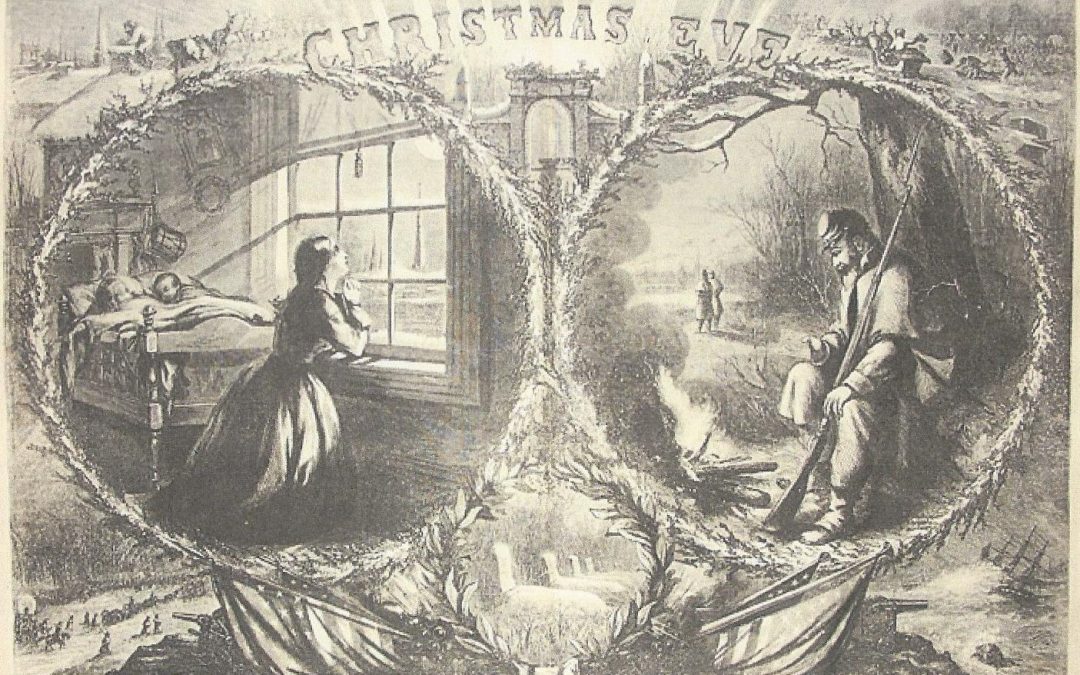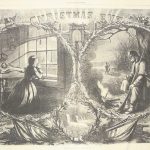George P. McClelland served with the 155th Pennsylvania Infantry, Union Army of the Potomac, from August 1862 to June 1865. He spent three Christmases in the field with his unit and wrote home to his sister Lizzie to report on his condition and to wish her the best for the Holiday Seasons. (George was 19 when he enlisted in 1862; Lizzie was two years his senior.)
Never bleak reports, the McClelland Christmas letters, nevertheless, were candid in reporting the difficult circumstances of being an infantryman during the Civil War. Combat, cold weather, and the absence of family dominated this soldier’s letters to his sister. George would have to wait until the Christmas of 1865 to be back with his family, at peace, and to celebrate the holidays in front of the home hearth.
McClelland’s first letter from the front lines at Christmas was written just after the battle of Fredericksburg, Virginia.
Camp near Fredericksburg
Saturday, December 20, 1862
My Dear Sister Lizzie,
Your interesting letter of December 4th I undertake to reply at last.
It seems strange to be sitting in the old tent writing this letter. This day one week ago something different was going on. Carnage and destruction is rife. We went into the engagement about 3 o’clock. While crossing the pontoon bridge, the Rebs opened on us with shell which fell on either side and in the water doing no damage. We were the eighth regiment of the Division in the crossing ….
It is useless to attempt to describe the engagement. Our Regiment went in first, reached the brow of the knoll, but could go no farther. We lay down behind it, but had to rise at every fire to do any execution. We were totally powerless. The enemy appeared to have it all their own way. Their shells were bursting over our heads, while the lead was flying thick and fast.
Our 1st Lieutenant was wounded on one side of me and several of the boys on the other were crying for their comrades to take them off the field. It was a wonder that I escaped. I stood on my feet and took as deliberate aim as I could. They shot a piece of my gun away, a splinter taking me on the leg doing no damage.
We left the field about 8 o’clock having lost 10 killed and 58 wounded. We got our ammunition replenished and moved out at 3 the next morning (Sabbath) and lay under fire all day. One of our Company was shot in the head while lying on the ground. We’re relieved about dark and marched through the town to the Court House ….
The city is swarming with troops. It is entirely ruined; one half of it burnt and destroyed while the troops have sacked the other half. Splendid libraries lying around the streets together with the most splendid furniture.
[General] Burnside, finding it impossible to take the impregnable hill just back of the town, gave orders to evacuate the town. The wounded were all taken to the other side of the river. This was done all day Monday and Monday night. Before Tuesday daylight, the whole Army was on the other side of the Rappahannock. If the Rebs had known of our retreat in time, what a slaughter there would have been ….
Such a time as we had when we did cross. It commenced raining furiously. On we plodded through water and mud 10 inches deep until we reached our old camp thoroughly soaked and benumbed with cold. To make it worse, the weather changed. It blew up cold and commenced snowing ….
I am not in Richmond yet and it is extremely doubtful whether we will even get there. I wish you a Merry Christmas and a Happy New Year.
Always, your Brother,
Geo. P. M.
Following a year when George McClelland participated in many skirmishes and battles, including Chancellorsville and Gettysburg, the battle-weary soldier rested in winter camp. Lizzie, now living in Davenport, Iowa, read the details of winter encampment in her brother’s Christmas letter.
Bealeton Station, Virginia
December 19, 1863
My Dear Sister Lizzie,
I avail myself of some spare time to write you my good little sister.
In the first place, briefly, the situation: we are now encamped near Bealeton, a station about 4 miles from the Rappahannock. The boys went to work with a will erecting quarters and I tell you we are pretty well defended against “Old Bones.”
My present residence is composed of logs built up about four feet from the ground, 2 shelter tents on top. It is 11 feet long in the inside and 6 feet wide. Then in one end there is a three-cornered fireplace, while a bunk, consisting of tolerably straight saplings cut into 6 foot poles and raised 2 feet from the ground, is in the other end ….
Our fire place is a “contrary thing” like a good many people. Sometimes it will smoke and persist in it in spite of everything or everybody. But I’ll fix it. I have run the chimney about 11 feet high. I’ll get a pork barrel and then a flour barrel and on top of that I’ll put a vinegar keg. I’m bound to make it draw.
The winter is upon us. It is cold, bitter cold (that is outside.) It’s pretty comfortable where I’m sitting now ….
The Army of the Potomac, yes, the Armies of the Union everywhere are settling down to inaction and repose. Questions of great and momentous importance to the Country now take the precedence. The wise and beneficent suggestions of our noble President are to be codified in the laws and statutes. Then, in the first opening of spring, with largely increased armies, we advance and put the quietus on armed rebellion.
But just now it’s too cold to think of fighting. The near approach of the Holidays suggest turkeys, mince pies and such like. A good many of the boys are going home on short furloughs … I’ll get as far as Pittsburgh (but I think no farther) about the 1st of February. Can’t get any more than 10 days and I couldn’t get to Davenport in that time.
I wish you all a Merry Christmas and a Happy New Year.
Affectionately,
Your Brother,
George
By the end of 1864, George McClelland had fought in the Overland Campaign led by General U.S. Grant, been wounded in battle at North Anna River, and received a commission as an officer. In December, the Union Army was focused on cutting Lee’s supply lines (for example, the Weldon Railroad), and holding the siege line at Petersburg. More aggressive action would wait until spring 1865. Meanwhile, George was so cold in his tent that he quickly closed his letter without including his traditional Holiday wishes.
Camp in the Woods, Virginia
Near Park Station
December 15, 1864
Dear Lizzie,
I am just recruiting my exhausted energies consequent on the great raid down the Weldon Railroad. We were about six days; marched 80 miles; devastated the whole country on our line of march. Rushed through mud, slush, rain, snow and hail. The 3rd day, while we were near Bellefield [Belfield], the next station past Jarratt’s, the whole country was covered with a sheet of ice, fully an inch thick. The javelin leaves of the pines looked like clusters of silver spears, while the fields looked like myriads of Lilliputian silver palaces. This soon melted away making the country a sea of mud.
The 5th day the weather was chilling cold and on that night (the 11th) everything inanimate was frozen solid. Animation was about suspended in me. Still 15 miles from our lines and the rough frozen roads rendered pedestrianism difficult and painful so that when we did at last reach home, I was most emphatically “played out.”
We suffered but little damage from the enemy. A few men who had straggled from the column were found with their throats cut and bodies stripped of clothing. One man of my Company is missing..
But to see the quick work made of the railroad: the whole Division deployed along the line and at a given signal, the whole track was upset for 5 miles. Then we set to work separating the ties and railroad iron. Built up the ties in piles and the rails on top. Then started the fires. Very soon the iron was warped and bent. For 18 or 20 miles it was a complete wreck. The boys will never forget the raid [on Weldon Railroad] ….
Here we are now in the woods on the frozen ground watching for something to turn up. I trust that “something” will be winter quarters. Now that the daring Sherman has got through all right, there will be no necessity for us to make any feints ….
Excuse this sprawling sheet. I have a tent without fire in it and am compelled to run out every minute to warm my fingers.
Love to all,
George
Illustration by Thomas Nast, Harper’s Weekly, January 1863
Letter excerpts from Your Brother in Arms: A Union Soldier’s Odyssey, University of Missouri Press, 2011.


Recent Comments